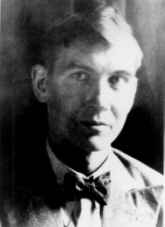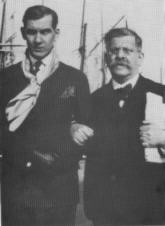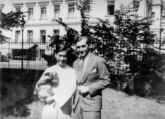| Karl Giese | ||
| (1898 - 1938) Institute archivist Giese met Hirschfeld around 1920 and became his friend and student. In the inner circles at the Institute, Giese was considered Hirschfeld's "foster son" and "woman of the house". Giese resided at the Institute with Hirschfeld, served as his secretary, held lectures, gave tours, and was head of the Institute archives. His living room became a meeting place for young homosexual men. Here, it was possible for them to meet undisturbed and undisguised; among them were archaeologist Francis Turville-Petre, who resided at the Institute, and English writer Christopher Isherwood, who based many of the characters in his novels on men he met there. This "dedicated, earnest, intelligent campaigner for sexual freedom had an extraordinary innocence. ... " reminisced Isherwood about Karl Giese, "Christopher saw in him the sturdy peasant youth with a girl's heart, who long ago had fallen in love with Hirschfeld, his father-image. Karl still referred to Hirschfeld as 'Papa.'" Biographical data: Giese grew up in a working-class family. After a lecture by Hirschfeld on homosexuality, Giese visited him in 1920. That marked the beginning of-in Hirschfeld's words- "a physical, psychological bond". When Hirschfeld did not return to Germany in 1932 after his world travels, Giese followed him and encountered Hirschfeld's new companion, Li Shiu Tong. Despite occasional bouts of jealousy, they succeeded in having a ménage à trois during their exile in France. Hirschfeld declared both lovers as his heirs. Giese was forced to leave France in October 1934 due to a "bath house affair". He went to Vienna and subsequently to Brno. He was later able to return to Nice. Giese evidently never came into Hirschfeld's inheritance. He lived in poverty in Brno and committed suicide in 1938. |
||
| X | ||
 | ||
| 1 | ||
 | ||
| 2 | ||
 | ||
| 3 | ||
 | ||